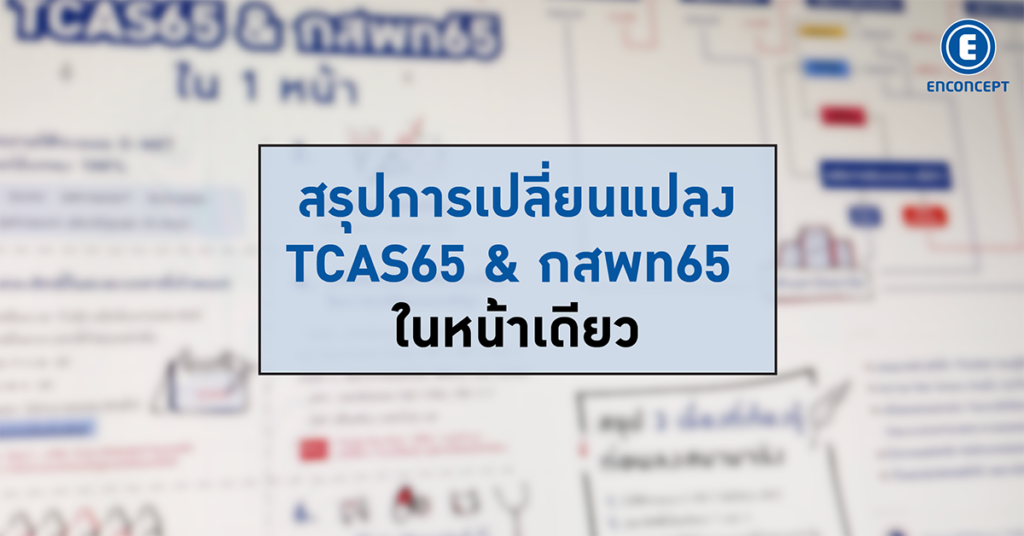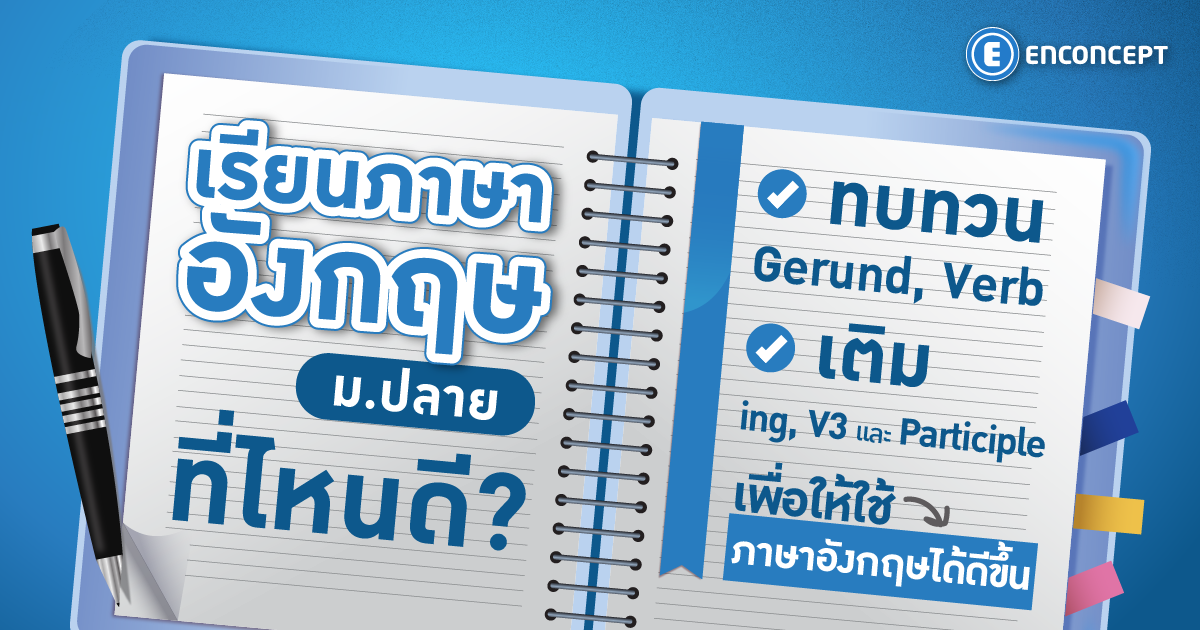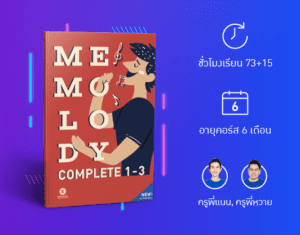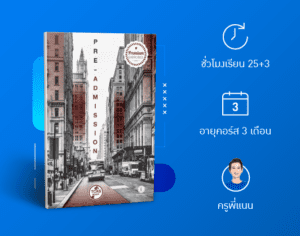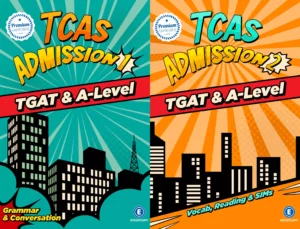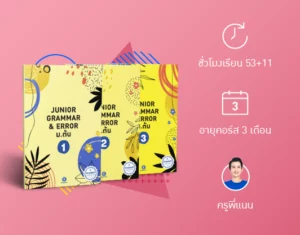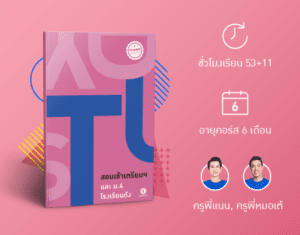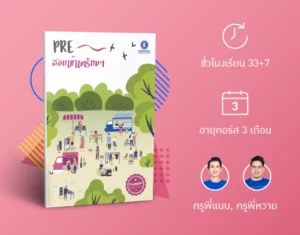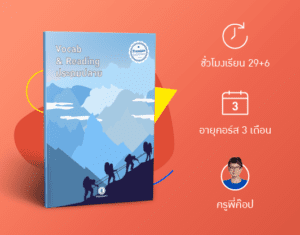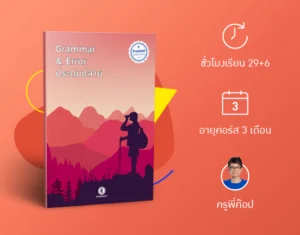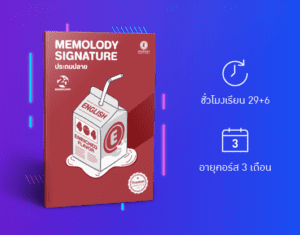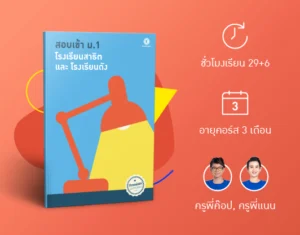การสอบเข้า โรงเรียนเตรียมอุดมศึกษา นับว่าเป็นหนึ่งในสนามสอบที่มีการแข่งขันสูงที่สุดของประเทศ ทุกปีจะมีนักเรียนจำนวนมากที่ตั้งใจอ่านหนังสืออย่างหนักเพื่อให้ได้ที่นั่งอันจำกัด จุดสำคัญที่ทำให้หลายคนพลาดคะแนนไปอย่างน่าเสียดาย คือ การไม่รู้แนวข้อสอบล่วงหน้า และไม่ได้เตรียมตัวกับเนื้อหาที่ออกบ่อยจริง โดยเฉพาะวิชาภาษาอังกฤษที่ต้องอาศัยความเข้าใจเชิงลึก ทั้ง Grammar, Vocabulary, Reading และที่สำคัญที่สุดคือ Collocation และ Preposition
Collocation คือ “การจับคู่คำที่ถูกต้องตามธรรมชาติ” เช่น rely on, apply for, wait for ถ้าเลือก preposition ผิดเพียงคำเดียว ความหมายก็จะผิดไปทันที ทำให้เสียคะแนนแบบไม่ควรจะเสียเลย ดังนั้น การรู้แนวข้อสอบและเตรียม Collocation ที่ออกสอบบ่อยตั้งแต่เนิ่น ๆ จะช่วยให้น้อง ๆ ทำข้อสอบได้เร็วขึ้น มั่นใจมากขึ้น และมีโอกาสก้าวเข้าใกล้การเป็นนักเรียนเตรียมอุดมมากกว่าเดิม
ทำไมต้องรู้แนวข้อสอบเตรียมอุดมก่อนสอบจริง?
สอบเข้าเตรียมอุดมคือสนามสอบระดับประเทศที่แข่งขันสูงมาก การรู้ แนวข้อสอบเตรียมอุดม ช่วยให้วางแผนการอ่านหนังสือได้ถูกจุด โดยเฉพาะวิชาภาษาอังกฤษที่มักถาม Grammar, Vocabulary, Reading และ Collocation / Preposition ที่ออกสอบทุกปี
โครงสร้างข้อสอบอังกฤษเตรียมอุดม
- Grammar & Structure (40-50%) – เน้น tense, preposition, relative clause
- Vocabulary (20-25%) – synonym, antonym, phrasal verb
- Reading Comprehension (20-25%) – main idea, inference
- Conversation (5-10%) – เติมบทสนทนาให้สมบูรณ์
Collocation & Preposition ที่ออกสอบบ่อย Must-Know!
Collocation คือการจับคู่คำที่มักใช้ร่วมกันอย่างเป็นธรรมชาติ เช่น wait for, rely on, apply for ซึ่งถ้าน้อง ๆ เลือก preposition ผิดแม้แต่คำเดียว จะทำให้ประโยคผิดความหมายทันที
ในการสอบเข้าเตรียมอุดม Collocation & Preposition ออกบ่อยมากในหลายพาร์ต เช่น
- Conversation: ต้องเลือกคำตอบที่ “ฟังแล้วเป็นธรรมชาติ” เช่น
A: I’m hungry.
B: Let’s go out _____ a change.
(เฉลย: for a change) - Cloze Test: เติมคำในช่องว่างให้ถูกทั้งไวยากรณ์และการจับคู่คำ เช่น
We should concentrate _____ our studies.
(เฉลย: on) - Error Identification: หาคำที่ผิด เช่น
He applied to a scholarship. ❌ (ควรเป็น applied for) - Reading: บางครั้งจะเจอคำถามถามความหมายของ collocation ในบทอ่าน เช่น out of reach, in advance, on purpose
เพราะฉะนั้น การจำ Collocation + Preposition ที่พบบ่อยจะช่วยให้น้อง ๆ ทำข้อสอบได้เร็วขึ้นและมั่นใจมากขึ้น ลดการเสียคะแนนแบบไม่จำเป็น
Verb + Preposition ที่ออกสอบบ่อย
| Verb | Preposition | Example Sentence |
| agree | with | I agree with your opinion. |
| apologize | for | She apologized for being late. |
| apply | for | He applied for a new job. |
| belong | to | This book belongs to me. |
| complain | about | He complained about the long wait. |
| concentrate | on | You should concentrate on your work. |
| depend | on | You can depend on her to help out. |
| focus | on | I need to focus on my studies. |
| participate | in | She participated in the school event. |
| prepare | for | We prepared for the exam all week. |
| rely | on | You can rely on me. |
| succeed | in | He succeeded in passing his exam. |
| wait | for | They are waiting for the train. |
| worry | about | Stop worrying about the test. |
| listen | to | Listen to the teacher carefully. |
Noun + Preposition Collocations
| Noun | Preposition | Example |
| fear | of | Sam’s fear of flying means he never travels abroad. |
| interest | in | Ken has no interest in sports. |
| argument | with | Luke had an argument with his sister. |
| change | in | Few were prepared for the sudden change in weather. |
| debate | about | I listened to a debate about child poverty. |
| threat | to | The speed limit poses a threat to pedestrians. |
| addiction | to | We were aware of Glen’s addiction to alcohol. |
| ban | on | We are all in favour of a ban on fireworks. |
| cure | for | Scientists search for a cure for cancer. |
| connection | between | Police are trying to understand the connection between the killer and the victim. |
| demand | for | There is a high demand for this product. |
| reaction | to | Anna had a strange reaction to her medication. |
| information | about / on | I asked for information about the building. |
| concern | about | People expressed concern about the pollution. |
| room | for | We don’t have room for more furniture. |
| story | about | She read us a story about a princess. |
| increase | in | The increase in fuel prices has affected us all. |
| lack | of | The lack of rain destroyed the crops. |
| recipe | for | Please give me the recipe for this cake. |
| distance | between | The distance between his house and mine is small. |
| photo | of | There is a photo of my grandmother on the wall. |
| matter | with | I don’t know what the matter is with him. |
Common Phrases + Idiomatic Expressions
| Phrase / Expression | Meaning | Example |
| At last | finally | After a long journey, at last we arrived. |
| On foot | walking (not by foot) | I usually go to work on foot. |
| By mistake | not meaning to | I dropped the glass by mistake. |
| In advance | beforehand | Book the tickets in advance. |
| Out of reach | too high or impossible | The kite was already out of reach. |
| For instance | for example | You should eat vegetables. For instance, have a salad. |
| In danger | in a risky situation | The child was in danger near the road. |
| Without fail | always / definitely | She calls me every Sunday without fail. |
| By chance | unexpectedly | I met him by chance in the market. |
| On purpose | intentionally | He broke it on purpose. |
| For a change | to do something different | Let’s eat sushi for a change. |
| On time | punctual | She was on time for the meeting. |
| To my surprise | I was surprised | To my surprise, he passed the test. |
| At once | immediately | You must do it at once. |
| In common | shared | We have many things in common. |
เทคนิคทำข้อสอบอังกฤษเตรียมอุดมให้ได้คะแนนสูง
ในการสนทนาและข้อสอบแบบ Conversation / Cloze Test / Multiple-choice ผู้ออกข้อสอบมักจำลองให้ใกล้เคียงภาษาพูดจริง (natural English) ซึ่งรูปแบบที่พบบ่อยที่สุดคือการวาง preposition ท้ายประโยค หรือที่เรียกว่า preposition stranding
ตัวอย่างที่ออกสอบบ่อย
- ✅ Who has he been writing to?
- ✅ What are you talking about?
สังเกตว่า to / about ถูกวางไว้ท้ายประโยค — แบบนี้เป็นสไตล์ที่เจ้าของภาษาพูดจริง ๆ
อีกแบบหนึ่งคือ Preposition Fronting หรือการย้าย preposition ไปข้างหน้า wh-word เช่น
- To whom has he been writing?
- About what are you talking?
แม้จะถูกต้องตามไวยากรณ์ แต่จะฟังเป็น ทางการมาก เหมือนภาษาเขียนหรือภาษาพิธีการ
ในการสอบเข้าเตรียมอุดม โดยเฉพาะพาร์ต Conversation หรือ Cloze Test
มักเลือกใช้ รูปแบบที่วาง preposition ท้ายประโยค เพราะใกล้เคียงการพูดจริงมากกว่า
สิ่งที่น้อง ๆ ต้องแม่น
- เข้าใจหลักไวยากรณ์ ของ wh-question: ต้องรู้ว่า wh-word เป็น subject หรือ object
- รู้ว่า verb + preposition ต้องใช้คู่กัน (collocation) เช่น
- wait for, listen to, apply for, vote for, rely on
- วิเคราะห์ประโยคให้ทันเวลา → ถ้าเป็น direct question ต้องกลับลำ (aux + subject)
- จำแนกว่าเป็น indirect question (I wonder / Do you know…) → ไม่ต้องกลับลำ
ทวนหลักไวยากรณ์สำคัญที่ต้องรู้ แบบเข้าใจง่าย
- บทบาทของคำถาม Wh- (subject vs object)
- ถ้า Wh-word เป็น subject → ไม่ต้องกลับลำ (no inversion)
- Who wrote the letter? (Who = subject)
- ถ้า Wh-word เป็น object หรือเป็น object ของ preposition → ต้องกลับลำ (inversion) ในคำถามตรง
- Who did you see? (Who = object)
- Who has he been writing to? (Who = object of to)
- ถ้า Wh-word เป็น subject → ไม่ต้องกลับลำ (no inversion)
- Direct Question vs Indirect Question (embedded question)
- Direct question (ประโยคคำถามตรง) → กลับลำ (auxiliary + subject + verb)
- Who has he been writing to?
- Who has he been writing to?
- Indirect question (คำถามฝังในประโยคเช่น I wonder… / I’m not sure…) → ไม่ต้องกลับลำ ใช้ word order ปกติของประโยคบอกเล่า
- I wonder who he has been writing to.
- ถ้าใช้ fronting (to whom), ก็เป็นทางการ: I wonder to whom he has been writing. (ถูก แต่ฟอร์มเป็นทางการ)
- I wonder who he has been writing to.
- Direct question (ประโยคคำถามตรง) → กลับลำ (auxiliary + subject + verb)
- Preposition + Wh-word: fronting vs stranding
- Stranding (วางท้าย) — What are you talking about? → พบบ่อยในการพูดและข้อสอบแบบ conversation/cloze
- Fronting (ย้าย preposition ข้างหน้า) — About what are you talking? หรือ To whom are you speaking? → ฟังทางการหรืองานเขียนแบบเป็นทางการมากกว่า
- Who vs Whom
- Whom เป็น object pronoun แบบดั้งเดิม: To whom did you give the book?
- ปัจจุบันในภาษาอังกฤษทั่วไป who มักใช้แทน whom ในการพูด/ข้อสอบ conversation — ถ้าตัวเลือกมี who ก็ใช้ได้บ่อย (แต่ถ้าข้อสอบเน้น grammar แบบเป็นทางการ อาจต้องเลือก whom)
- Whom เป็น object pronoun แบบดั้งเดิม: To whom did you give the book?
- ขาด preposition ที่จำเป็น (เช่น What are you waiting? ❌)
- ลำดับคำผิด (ไม่กลับลำในการถามตรง: Who he has been writing to? ❌)
- สับสนว่า Wh = subject หรือ object (เช่น Who wrote this? ไม่ใช่ Who did write this?)
- เลือก to whom เมื่อโจทย์เป็น conversation แบบ casual — ตัวเลือกท้ายประโยคมักถูกกว่า
สรุปเทคนิคทำข้อสอบอังกฤษเตรียมอุดม
- ถ้เห็น what / who / whom ให้ถามตัวเองทันทีว่าเป็น subject หรือ object
- ถ้าคำกริยามีคู่กับ preposition ฝึกจำเป็นคู่ (flashcards): wait for / rely on / apply for / listen to / vote for / participate in
- ถ้าโจทย์เป็น indirect question (มีคำว่า I wonder / I’m not sure / Do you know… ) → ใช้บอกเล่าปกติ
- ในหลายตัวเลือก ถ้ามีทั้งรูปแบบ fronting และ stranding ให้เลือกรูปแบบที่ เข้ากับน้ำเสียง: conversation → ปลายประโยค; formal → fronting (ถ้าข้อสอบเน้น grammar เป็นทางการก็อาจเลือก fronting)
ตัวอย่าง
- Who ___ you talking to? (ตัวเลือก: are / did / have)
- วิเคราะห์: direct question + object → ต้องมี auxiliary เหมาะกับ tense ของบริบท (present continuous) → are → Who are you talking to?
- วิเคราะห์: direct question + object → ต้องมี auxiliary เหมาะกับ tense ของบริบท (present continuous) → are → Who are you talking to?
- I don’t know ___ she is interested in. (เติม what/whom/if)
- วิเคราะห์: indirect question → ไม่ inversion + preposition required → interested in someone/thing → what → I don’t know what she is interested in.
น้อง ๆ ที่กำลังสอบเข้าเตรียมอุดมต้องเน้นทำโจทย์ Grammar และ Collocation ให้แม่น เพราะข้อสอบมักหลอก preposition และการเรียงประโยคบ่อย การรู้ แนวข้อสอบเตรียมอุดม และฝึกทำ ข้อสอบเก่าเตรียมอุดม จะช่วยเพิ่มโอกาสสอบติดได้มาก
ติวอังกฤษเข้าเตรียมอุดมที่ไหนดี?
การเลือก คอร์สติวสอบเข้าเตรียมอุดม ที่มีคุณภาพเป็นเรื่องสำคัญ คอร์สที่เหมาะสมควรมีเนื้อหาครอบคลุมทุกประเภทของข้อสอบและมีเทคนิคการทำข้อสอบที่ช่วยให้น้อง ๆ ทำคะแนนได้ดีในส่วนของ Reading เช่น คอร์สจาก Enconcept ที่มีการสอนเนื้อหาที่เข้มข้น พร้อมฝึกฝนทักษะที่จำเป็นต่อการสอบ
คอร์ส Pre-สอบเข้าเตรียมฯ
ก่อนไปเรียนคอร์สสอบเข้าเตรียมฯ อังกฤษ เพื่อติวเข้าเตรียมอุดมต้องเรียนคอร์สนี้ คอร์สนี้เหมาะสำหรับน้อง ๆ ม.ต้น ที่ต้องการเตรียมพร้อมสอบเข้าเตรียมฯ และ ม.4 โรงเรียนดัง แต่พื้นฐานยังไม่แน่น เน้นทบทวนเนื้อหา Grammar พื้นฐานแบบรวบรัด ผ่านเทคนิค Tree Tactics แผนผังภาพรวม Grammar Topics, ฝึกทำโจทย์เนื้อหาที่ต้องรู้ เช่น Tense, Voice, Modal Verb, Non-finite Verb ซึ่งเป็นเรื่องที่ออกบ่อยในสอบเข้าเตรียมฯ และ ม.4 โรงเรียนดัง พร้อมเรียนศัพท์ออกสอบผ่าน Memolody & กลอนคำศัพท์ และฝึกทำข้อสอบ Simulation Test เสมือนจริง 1 ชุด คอร์สนี้น้อง ๆ จะได้ทำโจทย์กว่า 400 ข้อ พร้อมเฉลยละเอียด
คอร์สสอบเข้าเตรียมฯ อังกฤษ
คอร์สแนะนำที่อยากติดเตรียมฯ ต้องเรียน คอร์สสอบเข้าเตรียมฯ อังกฤษที่เน้นเตรียมพร้อมสอบเข้าเตรียมฯ และ ม.4 โรงเรียนดัง เรียนเทคนิคการทำข้อสอบครบทุก Parts ทำข้อสอบ Conversation ให้ได้คะแนนเต็ม ด้วยเทคนิค 3’S พร้อมทบทวน Expressions ที่ต้องเจอในข้อสอบ ทบทวน Grammar เพื่อทำข้อสอบในส่วน Writting (Error Identification & Cloze Test) เรียนเทคนิคการทำข้อสอบ Reading : จับ Main Idea ของเรื่องด้วย Strategic Structure และ เทคนิคการตัด Choices ผิด ทบทวนศัพท์ผ่าน Memolody, กลอนคำศัพท์ และ เรียนเสริม Phrasal Verbs & Proverbs ทำข้อสอบ Simulation Test เสมือนจริง 3 ชุด : เพื่อฝึก & วัดผลคะแนนจริง คอร์สนี้น้อง ๆ จะได้ทำโจทย์กว่า 800 ข้อ
คอร์สตะลุยโจทย์สอบเข้าเตรียมฯ
คอร์สตะลุยโจทย์สอบเข้าเตรียมฯ เน้นตะลุยโจทย์จากข้อสอบเก่า เตรียมอุดม ครบทุก Parts เพื่อเพิ่มประสบการณ์วิเคราะห์และทำโจทย์ด้วยตัวเอง พร้อมทำข้อสอบ Simulation Test ข้อสอบเสมือนจริง 5 ชุด ซึ่งจะเป็นเหมือน Pre test ม.4 เตรียมอุดม ด้วย Self-Practice ให้น้องฝึกฝนจนชำนาญ
สมัครเป็น Pack สุดคุ้ม: จากปกติ 3 คอร์ส 18,900 บาท เหลือเพียง 12,900 บาท เท่านั้น!
















